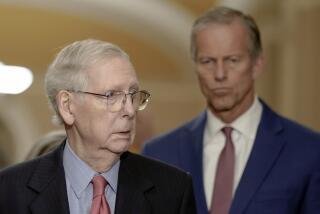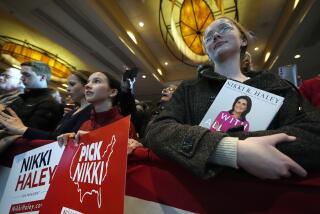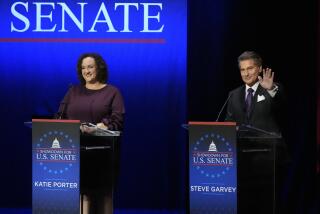The GOP horse race
With the demurrals last week of former Alaska Gov. Sarah Palin (“I need to be able to say what I want to say”) and New Jersey Gov. Chris Christie (“Now is not my time”), the Republican field in the 2012 presidential campaign lost a telegenic populist who might have energized tea partyers and an experienced conservative who might have soothed the party’s establishment. Instead, the race, which now appears largely set, will pit the party’s centrifugal forces against the efforts of candidates who so far haven’t shown much ability to hold it together.
Former Massachusetts Gov. Mitt Romney is the most obvious beneficiary of the week’s events, as Christie’s potential candidacy would have struck directly at the heart of Romney’s argument: that his experience and relative centrism make him the only candidate able to raise money and the only one capable of defeating President Obama. With Christie out of the way, some of those who had clamored for him to get into the race, and who are alarmed at the prospect of the party’s right wing seizing control, now find Romney their likely standard-bearer.
As big-money Republican donors resign themselves to Romney, it’s bound to help his fortunes, but he remains a difficult candidate for many Republicans to embrace. Zealots today demand a high degree of ideological fidelity, and Romney’s past — he once supported abortion rights, and he took great pride in Massachusetts’ healthcare reform, which was the model for much of what Obama adopted federally — makes him suspect to many conservatives. Meanwhile, his repudiation of those past views and half-hearted attempts to explain his switches have left even admirers concerned about his lack of a philosophical core. He is immensely pragmatic and has shifted over time to exploit political opportunity — not a time-tested way of inspiring deep loyalty.
For the party’s more passionate and populist voters, the choices are more numerous but no less challenging. Rep. Michele Bachmann (R-Minn.), former Pennsylvania Sen. Rick Santorum and Texas Gov. Rick Perry are competing for evangelical conservatives, but Bachmann’s flakiness and Perry’s alarming debate performances have dampened enthusiasm (she’s at about 7% in the polls, and he’s fallen from around 30% to less than 20%), while Santorum, who barely registers in surveys, concentrates on gnawing on Perry’s ankles, recognizing that the Texas governor overshadows him among supporters he needs. Pizza magnate Herman Cain is the latest to surge, mostly on Perry’s decline, but Cain campaigns more like a businessman on a book tour than a candidate actually trolling for votes. Rep. Ron Paul (R-Texas) generates enthusiasm among his backers — and is admired even by many who don’t support him — but he nevertheless labors on the margins, in part because his libertarian views (last week, he had to deny he was a pacifist) antagonize many traditional conservatives.
Meanwhile, former Utah Gov. Jon Huntsman, once a cheerleader for Palin, made a bit of news on her departure when he chided her for stringing people along over her decision about whether to run, but that mainly underscored his inability to nudge his own poll numbers. (He hovers at around 2%.) That leaves Newt Gingrich, a one-time star of the party who has stumbled his way through the campaign, shedding staff and failing to energize voters.
There are antecedents for most things in politics, and this Republican race calls to mind two modern primaries: the Democratic contest in 2004 and the Republican campaign in 1964, both of which featured establishment figures and party insurgents struggling for supremacy. In 2004, followers of Vermont Gov. Howard Dean, who energized young voters and others outside the party center, smelled victory when he jumped ahead of the pack in early polls in Iowa and New Hampshire; party regulars coalesced around Sen. John Kerry (D-Mass.), the establishment favorite, and propelled him to the nomination. The Republican race in 1964 was something of a mirror image as GOP conservatives, frustrated by Dwight Eisenhower’s presidency and Richard Nixon’s loss in 1960, blamed centrists for the party’s fortunes and demanded a standard-bearer of their own. Party leaders preferred New York Gov. Nelson Rockefeller, but the insurgents won out, nominating Arizona Sen. Barry Goldwater (“Extremism in the defense of liberty is no vice”).
Those two campaigns, 40 years apart, were different in many respects, but similar in that they highlight the obstacles facing candidates who run against incumbents, even weak ones, while tending to divisions within their own parties. In both cases, populist forces challenged a more traditional establishment, producing exciting, unpredictable primary races. But in neither instance did the eventual nominee succeed in healing the divisions. The result is that they had this too in common: Both times, they lost.
More to Read
A cure for the common opinion
Get thought-provoking perspectives with our weekly newsletter.
You may occasionally receive promotional content from the Los Angeles Times.






